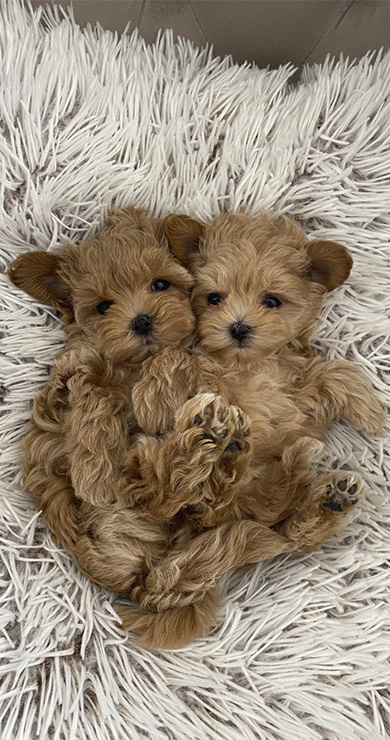- Home
- FAQ
Answers to frequently asked questions that you may be interested in

How is puppy vaccination conducted?
Typically, three sets of combination vaccinations are administered to puppies, starting from 51 days after birth with intervals of 21-28 days. The third combination vaccination includes an additional vaccination against rabies.
Throughout the entire vaccination period and 14 days after the final set of vaccinations, the puppy should be quarantined. This means it should not be taken outdoors, should not come into contact with outdoor footwear, hands should be washed after returning from a walk, and it should not interact with unfamiliar or unvaccinated animals.
Annual revaccination is necessary to maintain the animal’s immunity.
What is microchipping, and why is it done?
Microchipping is a modern method of electronic identification for dogs. Starting at a certain age, a microchip (no larger than a grain of rice) is implanted under the animal’s skin. The microchip contains a unique 15-digit code that can be read using a specialized scanner.
Microchipping is done for the following purposes:
- legal transportation of the animal across borders
- prevention of animal substitution
- facilitation of finding a lost pet.
How and when should deworming be done?
Preventing parasites is extremely important for the health of your puppy!
Even if the puppy feels well and shows no signs of parasite infestation, our veterinarians strongly recommend deworming every 2-3 months.
Remember, deworming is a necessary process for your puppy’s well-being!
Ticks and fleas?
Protecting puppies from ticks and fleas should be continuous, especially during the spring when parasites are most active!
After every walk, especially in natural environments, check for ticks on the puppy’s body.
Tick bites can lead to negative consequences and, if not responded to promptly, can result in irreversible or even fatal cases.
Fleas can cause dermatitis, anemia, or infection with worms or other dangerous diseases.
Since they can easily be picked up, even in the simple entrance area of your home, we recommend regularly using specialized preventive products and treatments to prevent negative consequences.
Remember, self-medication can be dangerous for your beloved pet!
Do MaltiPoos cause allergies?
These dogs are one of the most hypoallergenic breeds in the world. They have no odor, do not shed much, and their coat is similar to hair.
How to feed a puppy?
Until the age of 4 months, we recommend feeding the puppy four times a day. After 4 months, transition the puppy to three meals a day according to its age. We do not recommend feeding puppies from the table. Under no circumstances should you overfeed the puppy. Fresh still mineral water should be provided daily.
How to care for the coat?
Puppies should be brushed every 2-3 days with a special brush that won’t harm the delicate skin of the puppy. Grooming is allowed after the quarantine period is over, and it is recommended to do it once every 1.5 months. We recommend bathing the puppy as needed but no more than once a week.
Are puppies trained to use pee pads?
All our puppies are trained from an early age to use pee pads, but for your convenience, we recommend taking them for walks so that the dog becomes accustomed to going to the toilet outdoors.
Eyes, teeth, and ears?
Teeth cleaning can also be done at a grooming salon or at home using a special gel starting from the age 4 months.
Clean the eyes as needed with specialized products for grooming around the eyes.
We recommend cleaning the puppy’s ears once every 2 weeks with an antifungal and anti-inflammatory product called “Aurikap.”
How do puppies behave with children?
Maltipoo puppies are very playful and love children. However, we recommend teaching children some simple rules: not to wake the puppy up during sleep and not to disturb the dog while eating.
For the nervous system of puppies and their future relationship with children, it is crucial to provide them with personal space and time.



